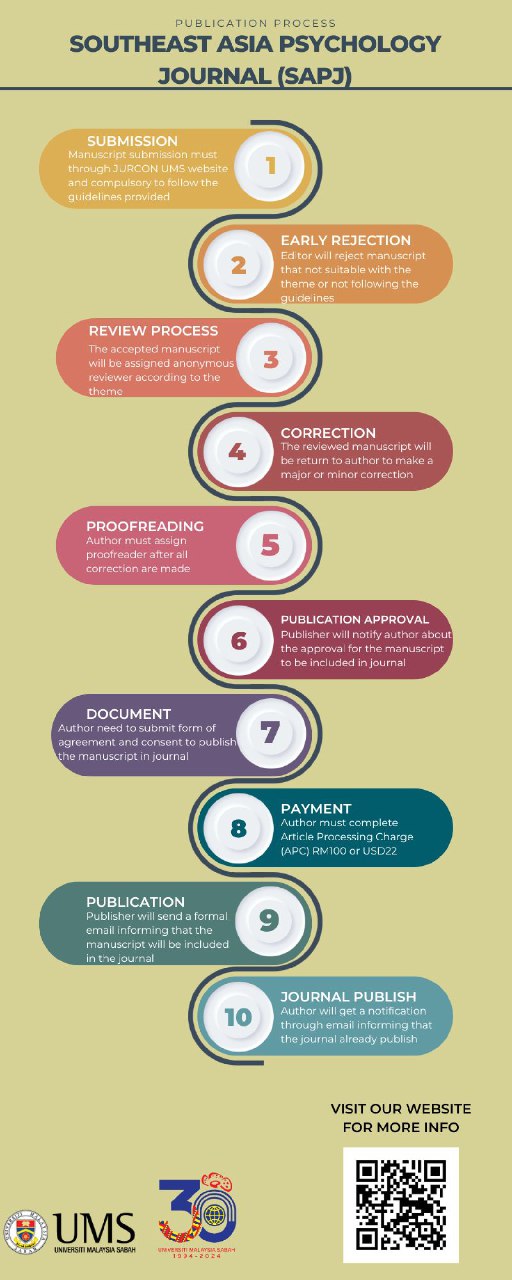THE ROLE OF FATHER INVOLVEMENT TOWARDS WELL-BEING ADOLESCENT
DOI:
https://doi.org/10.51200/sapj.v9i2.5090Keywords:
Adolescent, Father Involvement, Psychological Well-Being, Developmental PsychologyAbstract
This research aims to determine the factors that can play a role in development of psychological well-being in adolescents. Recent research development shows that the role of the father is very important in the parenting process to minimize negative parenting, develop responsibility, autonomy, and resilience in facing the challenges, and guide how the child gives a positive or negative evaluation of himself. This research used quantitative correlational and used purposive sampling with 153 adolesence (12-15 years old) who own and live with their fathers. The instrument used in this study are Psychological Well-being Scale (PWB) by Ryff and Father Involvement scale developed by the researcher. The analysis technique used is the spearman correlation. The result show value (p = 0.514 and p <0.05), meaning that there is a significant relationship between Father Involvement and Psychological well-being in adolescents.
References
Abqori, K. Z., & Risnawati, E. (2018). Pengaruh Attachment dengan Orangtua terhadap Psychological Well Being pada Mahasiswa Tingkat Akhir di Universitas Mercu Buana Menteng. Biopsikososial: Jurnal Ilmiah Psikologi Fakultas Psikologi Universitas Mercubuana Jakarta, 2(2).
Allgood, S. M., & Troy E. Beckert. (2012). The Role of Father Involvement in the Perceived Psychological Well-Being of Young Adult Daughters: A Retrospective Study. North American Journal of Psychology, 14. https://doi.org/10.21125/edulearn.2018.1158
Arulsubila, M., & R.Subasree. (2017). Parenting and Psychological Wellbeing of Adolescents- An Intervention Study. Journal Of Humanities And Social Science, e-ISSN: 2279-0837. Astuti, & E. S. Indrawati (2017) "Kesejahteraan Psikologis Ditinjau Dari Status Pekerjaan Ibu Bekerja Dan Ibu Tidak Bekerja Pada Siswa Di Sma IslamHidayatullahSemarang,Jurnal EMPATI, 6(1), 111-114,
Cruz, R. A., King, K. M., Widaman, K. F., Leu, J., Cauce, A. M., & Conger, R. D. (2011). Cultural Influences on Positive Father Involvement in Two-Parent Mexican-Origin Families. Journal Family Psychology, 25(5), 731–740.
Goncy, E. A. &Van Dulmen, M. H. M. (2010). Fathers do make a difference parental involvement and adolescent alcohol use. Fathering: A Journal of Theory Research and Pratice About Men as Fathers, 8(1), 93-108. https://doi.org/10.3149/fth.0801.93 Hidayati, F., Kaloeti, D. V. S., & Karyono. Peran ayah dalam pengasuhan anak. Fakultas Psikologi Universitas Diponegoro
Iro. (2018, Maret 08). kekerasan-remaja-indonesia-mencapai-50-persen. Retrieved from FKK UGM: https://fk.ugm.ac.id/kekerasan-remaja-indonesia-mencapai-50-persen/
Jia, R., & Schoppe-Sullivan, S. J. (2011). Relations Between Coparenting and Father Involvement in Families With Preschool-Age Children. Developmental Psychology, 47( )1, 106–118. Khodabakhsh, M. R., Kiani, F., & Ahmedbookani, S. (September 2014). Psychological Well-being and Parenting Styles as Predictors of Mental Health among Students: Implication for Health Promotion. International Journal of Pediatrics, 2(3):39-46. https://doi.org/10.22038/ijp.2014.3003 Mallers, M. H., & Neupert, S. D. (2010). Perception of chilhood relationship with mother and Father: Daily emotional and stressor experiences in adulthood. Developmental Psychology, 46(6), 1651-1665. https://doi.org/10.1037/a0021020 Mustofa, A. (2020, 01 16). Waspada jumlah kasus bunuh diri meningkat remaja paling rentan. Retrieved from Radar bali: https://radarbali.jawapos.com/read/2020/01/07/173725/waspada-jumlah-kasus-bunuh-diri-meningkat-remaja-paling-rentan
Palkovitz, R. (2002). Involved fathering and child development: Advancing our understanding of good fathering. In C. S. Tamis-LeMonda & N. Cabrera (Eds.), Handbook of father involvement: Multidisicplinary perspectives (119 – 140). Mahwah, New Jersey: Lawrence Erlbaum Associates.
Phares, V. (1993). Perceptions of Mothers' and Fathers' Responsibility for Children's Behavior. Sex Roles, 29(2).
Pleck, J. H. (2012). Integrating Father Involvement in parenting research. Parenting: Science And Practice, 12, 243–253.
Prabowo, A. (2016). Kesejahteraan Psikologis Remaja di Sekolah. Jurnal Ilmiah Psikologi Terapan, 4(2).
Risnawati, E., Arisandi, A., & Dawanti, R. (2019). Peran Religiusitas dan Psychological Well-Being terhadap Resiliensi Korban KDRT. MindSet, 10, 67-77.
Risnawati, E., Aulia, Q., & Aqmarina, F. N. (2020). Keterlibatan Ayah dalam Pengasuhan terhadap kecemasan sosial remaja (Studi Pada Budaya Patrilineal dan Matrilineal). In L. M. I. Wardani, Aplikasi Psikologi Positif: Pendidikan, Industri, dan Sosial (pp. 263-275). Pekalongan: PT. Nasya Expanding Management.
Ryff, C. &. (1995). The Structure of Psychological Well-Being Revisited. Journal of Personality and Social Psychology.
Ryff, C. (1989). Happiness is everything, or is it? Explorations on the meaning of psychological well-being. Journal of Personality and Social Psychology.
Ryff, C. (1995). Psychological well-being in adult life. Current Directions in Psychological Science. Santrock, J. W. (2016). Life-span development. New York: McGraw-Hill. Chicago Wardani, L. M. I., & Anwar, M. S. (2019). The role of quality of work life as mediator: Psychological capital and work engagement. Humanities & Social Sciences Reviews, 7(6), 447-463. DOI: 10.24854/jpu02019-238
Wardani, L. M. I., & Astuti, S. W. (2019). Gambaran kesejahteraan pesikologi generasi milenial pengguna media digita di Jakarta Selatan. Southeast Asia Psychology Journal, 7(1), 1-14.
Wardani, L. M. I., Wulandari, S. S., Triasti, P., & Sombuling, A. (2020). The effect of psychological capital on work engagement: Employee well-being as a mediator. Test Engineering & Management, 83, 17220-17229.
Wardani, L. M. I., Jeanne, Y., Mardhiyah, M., Komarudin, A., Istiqomah, & Rozi, F. (2021). Core self-evaluation as a mediator for social support and psychological well-being: A study of Indonesian migrant domesic worker candidates. Kasetsart Journal of Social Sciences, 42(3), 637-644. Doi: 10.34044/j.kjss.2021.42.3.27.








